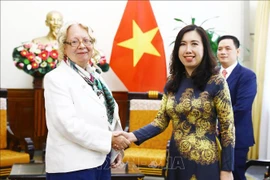 The meeting between Deputy Foreign Minister Do Hung Viet (R) and UN Special Rapporteur on the right to development Surya Deva in Hanoi (Photo: VNA)
The meeting between Deputy Foreign Minister Do Hung Viet (R) and UN Special Rapporteur on the right to development Surya Deva in Hanoi (Photo: VNA)Atthe meeting in Hanoi, Viet welcomed the Special Rapporteur’s proposal to chooseVietnam as the first country to visit after being appointed by the UN HumanRights Council (UNHRC).
Hehighlighted Vietnam’s approach of respecting, protecting and promoting humanrights, affirming that the country always puts people at the centre andconsiders them as the key stakeholder and impetus of the development process,which can be seen in the enormous achievements of Doi moi (Renewal) insocio-economic development, integration into the world, improvements in allaspects of people’s life, and the international community’s recognition.
Vietnamalways ensures people, socio-political organisations, people’s organisations,enterprises, non-governmental organisations, development partners, and relevantparties engage in and contribute to this process. It is giving high priority tothe realisation of the Sustainable Development Goals, with strong efforts beingmade in poverty reduction, climate change response, cutting net emissions tozero by 2050, environmental protection, and the building of a green and circulareconomy, he noted.
TheDeputy Minister expressed his belief that the visit is a chance for Vietnam toshare its good practices, challenges, priorities, and cooperation demand inthis regard.
Forhis part, Deva spoke highly of the hallmarks and initiatives of the country asa member of the UNHRC during 2023 - 2025, along with its responsible and activeparticipation in the Universal Periodic Review (UPR).
Sharingthe priorities of his term, the Special Rapporteur affirmed that he willmaintain the general, balanced and transparent approach, promote internationalcooperation for the goal of sustainable and inclusive development, and enhancepeople’s engagement in the building, implementation and supervision ofdevelopment policies.
Healso called on Vietnam to continue bringing into play its role in the UNHRC andhelp to effectively promote the right to development in the country and theworld.
Duringhis trip, Deva will have meetings with many central agencies, socio-politicalorganisations, people’s organisations, and enterprises. He will also visit somelocalities, projects, and socio-economic establishments to learn about thecountry’s achievements, challenges, priorities, and cooperation demand relatedto the right to development./.





























